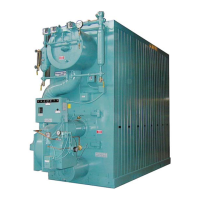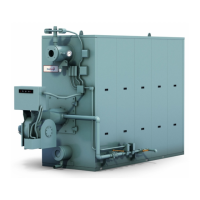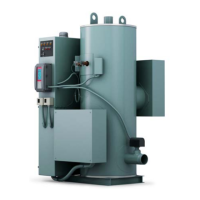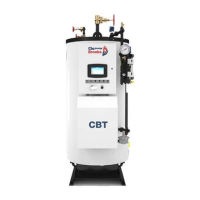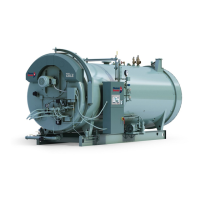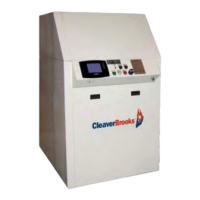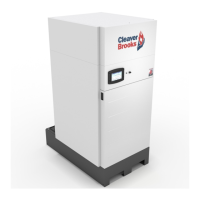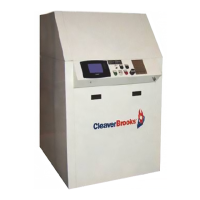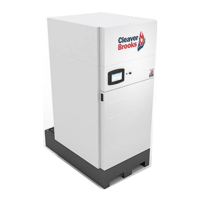Sequence Of Operation Chapter 4
750-177 4-3
The pilot flame must be established and proven by the flame
detector (FD) within a 10 second period in order for the
ignition cycle to continue. If for any reason this does not
happen, the system will shut down and safety lockout will
occur.
Note: Depending upon the requirements of
the regulatory body, insurer or fuel being
burned, either the 10 or 15 second pilot
ignition terminal may be used. Both provide
the same function but differ in time interval
allowed for proving main flame ignition.
Refer to the boiler wiring diagram.
With a proven pilot, the main fuel valve(s) (OV or MGV) is
energized and the main fuel valve light (FVL) in the panel is
lighted. The main flame is ignited and the trial period for
proving the main flame begins. It lasts 10 seconds for light oil
and natural gas. At the end of the proving period, if the flame
detector still detects main flame, the ignition transformer and
pilot valve are deenergized and pilot flame is extinguished.
Note: If the main flame does not light, or
stay lit, the fuel valve will close. The safety
switch will trip to lock out the control. Refer
to flame loss sequence (section D) for
description of action.
!
DANGER
WARNING
The cause for loss of flame or any other
unusual condition should be investigated
and corrected before attempting to restart.
Failure to follow these instructions could
result in serious personal injury or death
Run Cycle - With main flame established, the program relay
releases the modulating damper motor (MDM) from its low
fire position to control by either the manual flame control
(MFC) or the modulating control (MC), depending upon the
position of the manual-automatic switch (MAS). This allows
operation in ranges above low fire.
With the manual-automatic switch (MAS) set at automatic,
subsequent modulated firing will be at the command of the
modulating control (MC), which governs the position of the
modulating damper motor (MDM). The air damper and fuel
valves are actuated by the motor through a linkage and cam
assembly to provide modulated firing rates.
Note: Normal operation of the burner should
be with the manual-automatic switch in the
automatic position and under the direction
of the modulating control. The manual
position is provided for initial adjustment of
the burner over the entire firing range. When
a shutdown occurs while operating in the
manual position at other than low fire, the
damper will not be in a closed position, thus
allowing more air than desired to flow
through the boiler. Excess air flow subjects
the pressure vessel metal and refractory to
undesirable conditions.
The burner starting cycle is now complete. The (LDL) and
(FVL) lights on the panel remain lit. Demand firing continues
as required by load conditions.
Burner Shudown-Post Purge - The burner will fire until
steam pressure or water temperature in excess of demand is
generated. With modulated firing, the modulating damper
motor (MDM) should return to the low fire position before
the operating limit control (OLC) opens. When the limit
control circuit is opened, the following sequence occurs:
The main fuel valve circuit is deenergized, causing the main
fuel valve (MGV) or (OV) to close. The flame is
extinguished. The control panel lights (LDL) and (FVL) are
turned off. The blower motor continues to run to force air
through the boiler for the post purge period.
The blower motor start circuit is deenergized at the end of the
post purge cycle and the shutdown cycle is complete.
The program relay is now ready for subsequent recycling, and
when steam pressure or water temperature drops to close the
contacts of the operating control, the burner again goes
through its normal starting and operating cycle.
D. FLAME LOSS SEQUENCE
The program relay will recycle automatically each time the
operating control closes, or after a power failure. It will
lockout following a safety shutdown caused by failure to
ignite the pilot, or the main flame, or by loss of flame.
Lockout will also occur if flame or flame simulating
condition occurs during the prepurge period.
The control will prevent start-up or ignition if limit circuit
controls or fuel valve interlocks are open. The control will
lock out upon any abnormal condition affecting air
supervisory controls wired in the running interlock circuit.
!
DANGER
CAUTION
The lockout switch must be manually reset
following a safety shutdown. The cause for
loss of flame or any unusual condition
should be investigated and corrected be-
fore attempting to restart. Failure to follow
these instructions could cause damage to
the equipment.
1. No pilot flame.
The pilot flame must be ignited and proven within a 10-
second period after the ignition cycle begins. If not proven
within this period, the main fuel valve circuit will not be
powered and the fuel valve(s) will not be energized. The
ignition circuit is immediately deenergized and the pilot
valve closes, the reset switch lights and lockout occurs
immediately.
